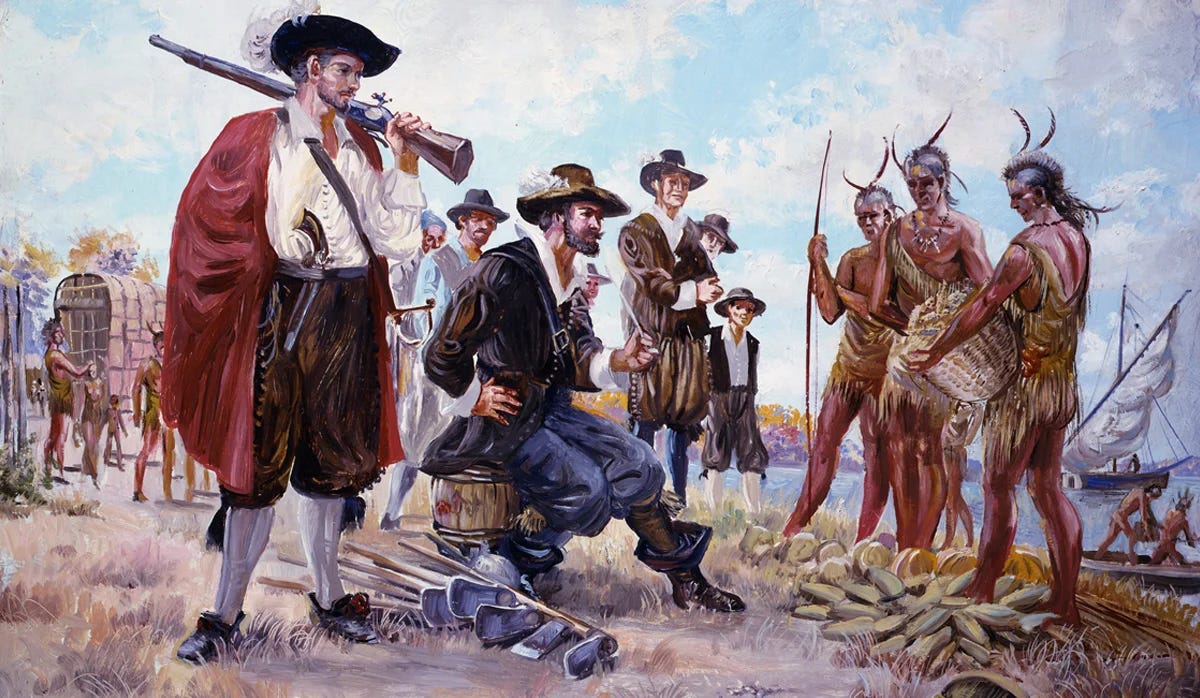On This Day in 1608: How John Smith’s Ruthless Resolve Saved Jamestown from Collapse
One man’s grit held the colony together
The Day Jamestown Found Its Backbone
On this day in 1608, the starving, disease-ridden colony of Jamestown elected John Smith as its president. It was not a vote of admiration. It was a last resort. He was brash, arrogant, and widely distrusted. But he was also the only man willing to do what others would not, take control.
Smith did not save Jamestown because he was beloved. He saved it because he refused to watch it die. What he found when he returned from an expedition that September was nothing short of a disaster. Dozens were dead. Most of the rest were on the edge of collapse. Disease choked the air, and men cowered in rotting huts too weak to work.
That morning, Jamestown did not need a diplomat. It needed a dictator with a shovel in one hand and a musket in the other.
John Smith Was Not the Hero Anyone Wanted
When Smith stood in front of the colony’s council on September 10th, he was not seen as a saviour. He was a troublemaker, a man who had already survived threats of execution, political sabotage, and Native captivity. Many saw him as a pirate pretending to be a soldier. But those same critics had run out of food and options.
Jamestown had become a monument to delusion. Built in a swamp, chosen for defence rather than sustainability, it was plagued by mosquitoes, rot, and isolation. The settlers, many of them upper-class men, had arrived expecting riches. They found starvation and work. Most wanted neither.
Smith understood that. He did not try to inspire them. He gave them a choice: work or starve. His now-famous edict, “He who shall not work shall not eat,” was more than a slogan. It was a sentence. A blunt ultimatum that separated dreamers from survivors.
Ruthless Tactics Kept the Colony Breathing
Smith was not interested in compromise. When diplomacy did not feed his people, he turned to intimidation. He raided local tribes, smashed idols, and showed off the colony’s firepower to force trade. His dealings with Chief Powhatan were bold and often dishonest. He tricked him over cannons. He refused to show weakness. He lied when it suited him.
Yet without that audacity, the colony would have vanished before winter.
Twice, Smith was nearly killed. First, when he was captured by Powhatan and only spared, possibly, by the intervention of the chief’s daughter, Pocahontas. And again in 1609, when a bag of gunpowder exploded in his canoe under suspicious circumstances. Burned and half-drowned, he survived, but his injuries ended his presidency.
Even after leaving for England, the impact of his short tenure lingered. The colony’s brief flashes of stability, expanded defences, cleared farmland, and repaired storehouses all came under his rule. His strict leadership laid the groundwork, even if others reaped the eventual profits.
Jamestown Survived Because He Refused to Let It Die
After Smith’s departure, the settlement entered its darkest days. The “Starving Time” in the winter of 1609 wiped out hundreds. Colonists turned to cannibalism. Out of 400 settlers, fewer than 60 were left by spring.
That collapse showed how fragile Jamestown truly was without hard leadership. It was not agriculture, diplomacy, or luck that had sustained the colony before. It was Smith’s cold calculation and refusal to let fantasy dictate survival.
He did not make friends. He made order. When settlers daydreamed about gold and silk, he reminded them they were dying. When gentlemen refused to farm, he put a shovel in their hands or left them hungry. When local tribes hesitated to trade, he made them fear what might happen if they did not.
This was not vision. It was realism with blood under the nails.
Legacy Built on Grit, Not Glory
John Smith was never going to be celebrated in polite circles. He was not polished, and he did not pretend to be. But leadership in the face of extinction does not reward politeness. It rewards nerve. And Smith had it in spades.
He has been mythologised, vilified and romanticised, especially in children’s tales about Pocahontas. But strip away the legend, and what is left is a man who dragged 100 starving, dying settlers through disease, disaster and insubordination into the first foothold of what would become America.
Tobacco may have made Jamestown rich later, but Smith made it survive long enough to get there. He was the kind of leader history does not like but cannot ignore. He did not save Jamestown with virtue. He saved it with stubborn, unapologetic resolve.
On this day in 1608, that resolve became the backbone of a colony. And without it, there might never have been a second chance.


